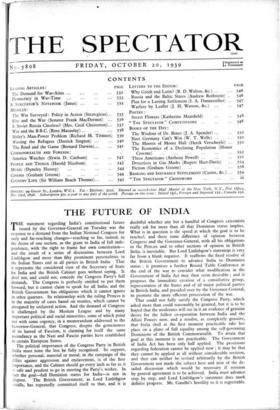THE FUTURE OF INDIA
THE statement regarding India's constitutional future issued by the Governor-General on Tuesday was the response to a demand from the Indian National Congress for early and far-reaching changes—reaching so far, indeed, in the desire of one section, as the grant to India of full inde- pendence, with the right to frame her own constitution— and the result of a series of discussions between Lord Linlithgow and more than fifty prominent personalities in the Indian States and in all parties in British India. That it represents the considered view of the Secretary of State for India and the British Cabinet goes without saying. It doest not, and could not, concede the Congress Party's full demands. The Congress is perfectly entitled to put them forward, but it cannot claim to speak for all India, and the British Government has obligations which it cannot ignore in other quarters. Its relationship with the ruling Princes is in the majority of cases based on treaties, which cannot be abrogated by unilateral action, And the demand of Congress is challenged by the Moslem League and by many important political and social minorities, some of which point out with some cogency, in a memorandum addressed to the Governor-General, that Congress, despite the genuineness of its hatred of Fascism, is claiming for itself the same ascendancy as the Nazi and Fascist parties have established in certain European States.
The political importance of the Congress Party in British India must none the less be fully recognised. Its support, whether personal, material or moral, in the campaign of the Allies against aggression and enslavement, is of the first importance, and the Cabinet should go every inch as far as it is safe and prudent to go in meeting the Party's wishes. In fact the goal--full Dominion status for India—is not in dispute. The British Government, as Lord Linlithgow recalls, has repeatedly committed itself to that, and it is doubtful whether any but a handful of Congress extremists really ask for more than all that Dominion status implies. What is in question is the speed at which the goal is to be reached, and there some difference of opinion between Congress and the Governor-General, with all his obligations to the Princes and to other sections of opinion in British India, is inevitable. But Lord Linlithgow's statement is very far from a blank negative. It reaffirms the fixed resolve of the British Government to advance India to Dominion status ; it promises a further Round Table Conference at the end of the war to consider what modification in the Government of India Act may then seem desirable ; and it proposes the immediate creation of a consultative group, representative of the States and of all major political parties in British India, and presided over by the Governor-General, to promote the more efficient prosecution of the war.
That could not fully satisfy the Congress Party, which asked more than could reasonably be granted, but it is to be hoped that the moderates will see in it an evidence of genuine desire for the fullest co-operation between India and the Allied Powers now, and a resolve, as completely genuine, that India shall at the first moment practicable take her place on a plane of full equality among the self-governing Dominions of the British Commonwealth To attain that goal at this moment is not practicable. The Government of India Act has been only half applied. The provisions regarding federation cannot be applied now ; it may be that they cannot be applied at all without considerable revision, and they can neither be revised arbitrarily by the British Government nor made the subject here and now of the de- tailed discussion which would be necessary if revision by general agreement is to be achieved. India must advance step by step, and Lord Linlithgow's statement does mark definite progress. Mr. Gandhi's hostility to it is regrettable.












































